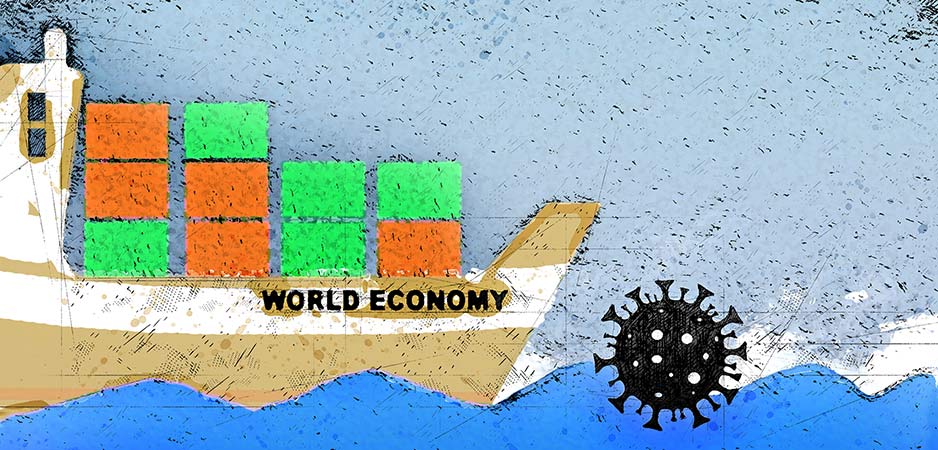
The world economy is in unprecedented danger. According to a forecast by the German government, that country's economy is on course for the worst recession since World War II, with GDP likely to contract by 6.3 percent this year, with the number of unemployed people at levels never seen before.
The outlook for the American economy is even more dire. Some big investment banks, such as Morgan Stanley have forecast a contraction of 4 to 7.5 percent in the first quarter and 30 to 40 percent in the second. The Congressional Budget Office also reckons that U.S. GDP will shrink by 40 percent in the second quarter.
By late April, the official U.S. unemployment rate had reached 25 percent. Government data show that 26.5 million workers, or about 16.5 percent of the nation’s workforce of 165 million, have applied for unemployment relief. Morgan Stanley predicted a total loss of 40 million jobs by the end of May. The renowned Economic Policy Institute estimated that as many as 13.9 million unemployed people had not yet filed their applications for unemployment relief, and that probably there are already 40 million people out of work.
The size and pace of contraction of the real economy in the U.S. has been unprecedented. Even during the Great Depression of the 1930s, the contraction process was intermittent and slow. It took about four years for the unemployment rate to reach 25 percent (1932-33). This time, the U.S. economy has collapsed in just two or three months to Great Depression unemployment levels.
The U.S. government has announced that the economy would rebound in the third quarter. Prominent economists, including Paul Krugman and Larry Summers, published their opinions in mainstream media predicting that a V-shaped rebound will come soon.
The Wall Street Journal, however, reported that corporate America has just been through a wave of defaults and bankruptcies unseen in years. Major oil companies and department stores, which were already in trouble before the pandemic, have filed for bankruptcy protection. Even in industries that had been operating well, such as automobile manufacturing, tourism, leisure and healthcare, many companies have filed for bankruptcy.
If the recession persists, a second and more severe wave of corporate restructurings will follow. The U.S. Federal Reserve has promised an unprecedented $9 trillion in loans and financial support, double what it provided during the 2008 financial crisis. Whether that initiative will succeed or not remains a question.
After the mild recession of 2008, employment did not return to the 2007 level until 2015. From 1929 to 1933, the U.S. economy experienced a series of troughs. President Roosevelt introduced the New Deal in the fall of 1934, but the economy did not start recovering until 1935. It fell back into recession again in 1938 and finally entered into a strong recovery, only because of the stimulus provided by World War II around 1940-41.
The world economy is not a simple sum of national economies. Rather it's an extremely complex and internally unified organic system formed over time. Within it, national economies are interconnected.
When the U.S. stock market crashed in October 1929, marking the beginning of the Great Depression, the U.S. and European countries adopted “beggar-thy-neighbor” policies and raised tariffs. Economic independence became the goal sought by all. Instead of moving closer and getting friendlier toward each other and seeking stability and peace, nations fell into mutual suspicion, fear and exchanges of threats. Then came the war.
Drawing on the historical lessons of the 1930s, the leaders of China and the U.S. agreed in the wake of the 2008 financial crisis to create the G20 mechanism to tide the world over through difficult times through strengthened international cooperation. It has resulted in a decade of economic prosperity, peace and stability.
The current international political situation is quite different from that of 2008, but it bears some resemblance to that of the 1930s. Some conservative politicians in the U.S. and Europe are trying to blame China for the COVID-19 pandemic, for the economic recession, unemployment and other problems.
In addition to sustaining a trade war, decoupling and de-sinicizing, they also want China to pay a large sum of compensation. Needless to say, that's not going to happen, and it would not save the world economy if it did.
Ancient scholars pointed out that the most benevolent people repair, but the evil create havoc. China has always adhered to the principle of non-confrontation or conflict, choosing instead mutual respect and win-win cooperation. Its belief is that this is the only proper way to deal with world political or economic crises. It is the way of benevolence.
Moreover, as China is not indebted to any other country, it will neither beg anyone nor be frightened of anyone. If American and European politicians still have the ability to approach the rest of the world in good faith, there may be a chance to avert a more serious crisis.
